2020年新人教版高中英语必修三导学案全套
- 格式:docx
- 大小:1.03 MB
- 文档页数:94
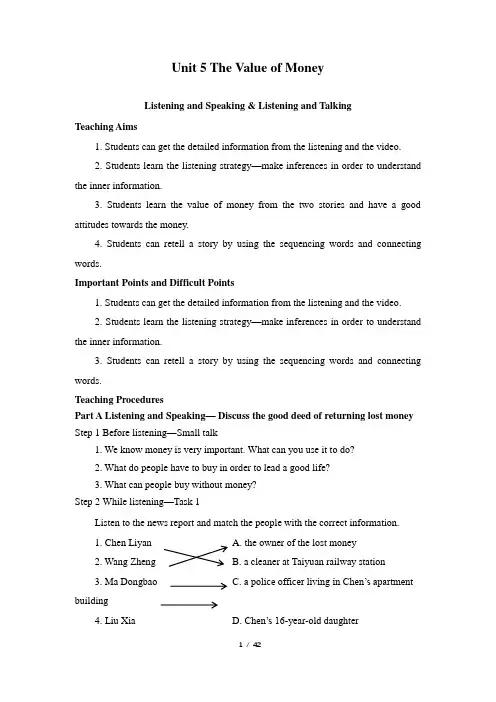
Unit 5 The Value of MoneyListening and Speaking & Listening and TalkingTeaching Aims1. Students can get the detailed information from the listening and the video.2. Students learn the listening strategy—make inferences in order to understand the inner information.3. Students learn the value of money from the two stories and have a good attitudes towards the money.4. Students can retell a story by using the sequencing words and connecting words.Important Points and Difficult Points1. Students can get the detailed information from the listening and the video.2. Students learn the listening strategy—make inferences in order to understand the inner information.3. Students can retell a story by using the sequencing words and connecting words.Teaching ProceduresPart A Listening and Speaking— Discuss the good deed of returning lost money Step 1 Before listening—Small talk1. We know money is very important. What can you use it to do?2. What do people have to buy in order to lead a good life?3. What can people buy without money?Step 2 While listening—Task 1Listen to the news report and match the people with the correct information.1. Chen Liyan A. the owner of the lost money2. Wang Zheng B. a cleaner at Taiyuan railway station3. Ma Dongbao C. a police officer living in Chen’s apartment building4. Liu Xia D. Chen’s 16-year-old daughterStep 3 While listening—Task 2Listen again and put these events in the correct order. Then check the answers in class.Step 4 While listening—Task 3Listen again and decide if the following statements are true (T) or false (F) in Activity 4. Then have several Ss check the answers in class.Step 5 Post listening—Speaking1. Go through “Make inferences” in Activity 5. Then discuss your answers to thequestions withyour partner and explain your reasoning.(1)What kind of person do you think Chen Liyan is?(2)Did Chen return the money because she didn’t need it?(3)Is it common for people to do what Chen did?(4)How did Wang Zheng feel about the return of his money?(5)Why did Ma Dongbao tell Wang about Chen’s family?(6)How did the news reporter feel about Chen’s actions?2. Work in groups of four. Discuss the following questions. Then ask some Ss toshare their ideas.(1)Do you agree with Chen Liyan? What would you do if you were in her situation?(2)When we help someone, should we expect to get something in return?(3)What do you think is the best way to get money?(4)Should we judge people based on how much money they have?Step 6 Pronunciation—Intonation语调(intonation),即说话的腔调,就是一句话里的声调(pitch)高低抑扬轻重的配置和变化。
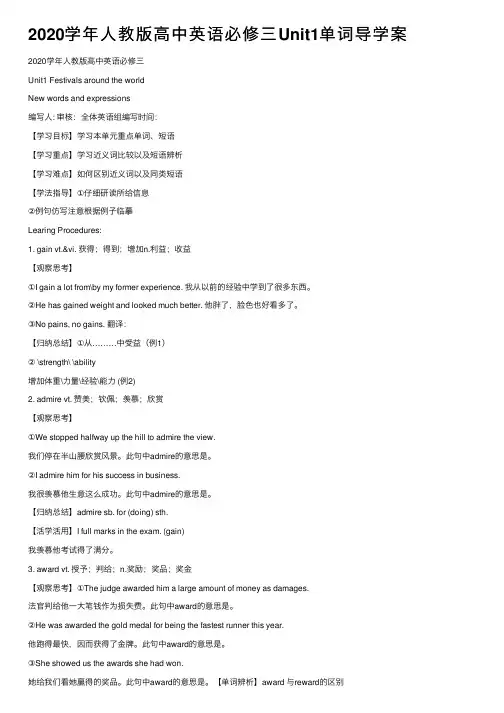
2020学年⼈教版⾼中英语必修三Unit1单词导学案2020学年⼈教版⾼中英语必修三Unit1 Festivals around the worldNew words and expressions编写⼈: 审核:全体英语组编写时间:【学习⽬标】学习本单元重点单词、短语【学习重点】学习近义词⽐较以及短语辨析【学习难点】如何区别近义词以及同类短语【学法指导】①仔细研读所给信息②例句仿写注意根据例⼦临摹Learing Procedures:1. gain vt.&vi. 获得;得到;增加n.利益;收益【观察思考】①I gain a lot from\by my former experience. 我从以前的经验中学到了很多东西。
②He has gained weight and looked much better. 他胖了,脸⾊也好看多了。
③No pains, no gains. 翻译:【归纳总结】①从………中受益(例1)② \strength\ \ability增加体重\⼒量\经验\能⼒ (例2)2. admire vt. 赞美;钦佩;羡慕;欣赏【观察思考】①We stopped halfway up the hill to admire the view.我们停在半⼭腰欣赏风景。
此句中admire的意思是。
②I admire him for his success in business.我很羡慕他⽣意这么成功。
此句中admire的意思是。
【归纳总结】admire sb. for (doing) sth.【活学活⽤】I full marks in the exam. (gain)我羡慕他考试得了满分。
3. award vt. 授予;判给;n.奖励;奖品;奖⾦【观察思考】①The judge awarded him a large amount of money as damages.法官判给他⼀⼤笔钱作为损失费。
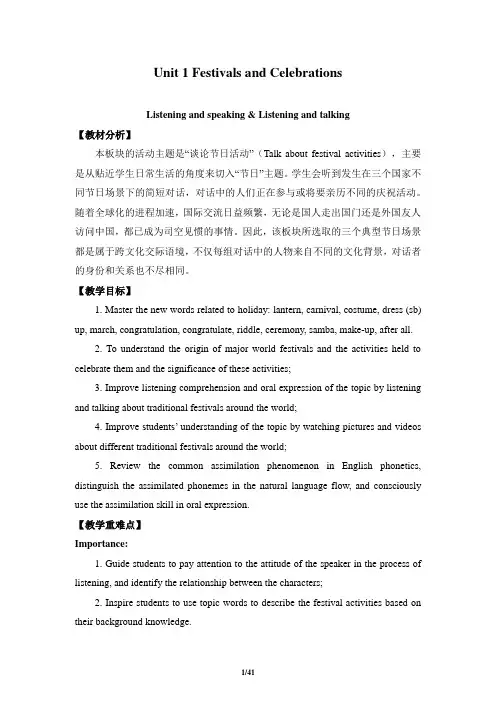
Unit 1 Festivals and CelebrationsListening and speaking & Listening and talking【教材分析】本板块的活动主题是“谈论节日活动”(Talk about festival activities),主要是从贴近学生日常生活的角度来切入“节日”主题。
学生会听到发生在三个国家不同节日场景下的简短对话,对话中的人们正在参与或将要亲历不同的庆祝活动。
随着全球化的进程加速,国际交流日益频繁,无论是国人走出国门还是外国友人访问中国,都已成为司空见惯的事情。
因此,该板块所选取的三个典型节日场景都是属于跨文化交际语境,不仅每组对话中的人物来自不同的文化背景,对话者的身份和关系也不尽相同。
【教学目标】1. Master the new words related to holiday: lantern, carnival, costume, dress (sb) up, march, congratulation, congratulate, riddle, ceremony, samba, make-up, after all.2. To understand the origin of major world festivals and the activities held to celebrate them and the significance of these activities;3. Improve listening comprehension and oral expression of the topic by listening and talking about traditional festivals around the world;4. Improve students’ understanding of the topic by watching pictures and videos about different traditional festivals around the world;5. Review the common assimilation phenomenon in English phonetics, distinguish the assimilated phonemes in the natural language flow, and consciously use the assimilation skill in oral expression.【教学重难点】Importance:1. Guide students to pay attention to the attitude of the speaker in the process of listening, and identify the relationship between the characters;2. Inspire students to use topic words to describe the festival activities based on their background knowledge.Difficulties:In the process of listening to the correct understanding of the speaker’s attitude, accurately identify the relationship between the characters.【课前准备】1. To understand the origin of traditional festivals in the world, the celebration activities (customs) of these festivals and the meaning of these activities;2. Talk about holiday celebrations;3. Preview: understand the new words according to the context.【教学过程】Step 1 Lead-inTeachers talk about the world’s traditional festivals, such as the Lantern Festival in China, adults’ day in foreign countries, carnivals and so on.Step 2 Watching and talkingActivity 11. Teacher lets Ss look at some pictures about festival activities. During talking about these activities, teacher can add some background knowledge about festivals.Questions:①What festivals do the pictures show us?②In which country do you think people celebrate each festival?③How do people celebrate each festival?2. Ask sb to choose some words or phrases from the box to celebrate eachfestival.3. Teacher can show students how to use these word blocks and learn to describeholiday activities in groups. For example:On the Coming-of-Age Day, young girls in Japan would wear traditional costumes.One of the most important activities during the Lantern Festival is to guess riddles.During the Rio Carnival, you can watch wonderful samba dances.4. The teacher asks students to report the results of the group lecture. Ask thesequestions:①What do people do to celebrate the Chinese Lantern festival?②Who will celebrate Coming-of-Age Day? What do they do to celebrate it?③What do you expect to see if you go to the Rio Carnival?5. Learn some words and phrases in the box.Step 3 ListeningActivity 21. Teacher asks sb to read “Listen for relationships”, In pairs, discuss how to identify relationships between people based on their tone and content. The teacher can provide the following questions to inspire students to discuss.①What does a tour guide usually say to a tour group? What expressions arefrequently used?②What questions does an interviewer usually ask during an interview?③What would a reporter say or do if he/she wants to interview a tourist?④How do friends usually talk?2. Some group representatives are invited to communicate and speak in class.3. Teacher plays the listening tape for students to listen to and write the order of the conversations next to the names of the festivals.4. Play the tape again, students match each conversation with the relationship between the speakers.5. Check the answers with class.Activities 3-41. Teacher asks students to look at the tasks and requirements of activity 3. Then read the main ideas of the three dialogues. (Guide the students to guess and fill in the words according to the context. Let the students analyze the English syntactic structure based on the meaning of the sentence and make reasonable inferences.)2. Teacher plays the tape for the second time. After listening to the tape, students discuss the answers in pairs. Then the class communicates and checks the answers.3. Teacher lets students listen to the tape for the third time (Before the teacher plays the recording for the third time, the teacher should prepare the students to takenotes and remind them to catch key words, especially phrasal verbs.).Step 4 SpeakingActivity 51. Lead the dialogue by asking questions. Let students understand how to discuss their favorite festivals and give their reasons.E.g.,Conversation 1T: Which of the three festivals do you like best?S1: I think the Coming-of-Age Day is the most interesting.T: Why is it your favourite?S1: Because I like to see women dressed up in their colorful traditional kimonos.Conversation 2T: Which of the three festivals attracts you most?S2: The Chinese Lantern Festival.T: I suppose you like yuanxiao, the sweet dumplings.S2: Not only that. I especially like guessing riddles and I’m good at it.2. Follow the example of the conversation in activity 5 and work in pairs to discuss your favorite holiday and explain why. After the discussion, the teacher asks some groups to show the dialogue.Step 5 ActingOne student plays the role of a journalist. The other three students play the roles of the characters in the listening dialogue. They are the Japanese girl attending the coming-of-age ceremony, the girl attending the Rio carnival, and the tourist visiting China. The following questions can be used in the interview:①What is the purpose of this festival?②How do you usually celebrate this festival?③What do you like best about this festival?Step 6 Pronunciation1. Help students recognize speech assimilation.(1)Teacher plays the recording of activity 1 and asks the students to pay attention to the pronunciation changes of bold letters while listening.(2)Teacher organizes students to carry out activities in pairs: the teacher plays the recording, one person in the group reads after the words and phrases in activity 1, the other person compares the pronunciation of the recording with that of his partner carefully, and points out the pronunciation problem of his/her partner if there is any difference. Then switch roles, listen to the tape again and complete the same task.2. Let students imitate and read.(1)Teacher guides students to understand the requirements of activity 2. Before listening to the tape, the teacher asks the question for students to think: “How does your pronunciation change while reading the sentences?”(2)Teacher plays the tape for the first time. The students read after the sentences in activity 2.(3)Teacher plays the tape for the second time, the students repeat the sentences again, and then discuss with their partners the differences between the pronunciation of the bold consonants in words and the pronunciation in sentences, and describe the phonetic assimilation in the flow.(4)Teacher asks different students to read the six sentences of activity 2 and report the result of the discussion on phonetic assimilation. The teacher supplements and corrects the students’conclusion, explains it appropriately, and writes the assimilation pronunciation in these sentences on the blackboard or presents it to the students through the courseware.Step 7 Listening and TalkingActivity 61. Learn the new words about the festivals.2. Look at the pictures and predict what festival Song Lin and Max are going to talk about.3. Listen and answer the questions.①What festival is Max talking about?②What did Max’s mother cook?③What did Max do during the festival?④What did Max and his family do during and after the dinner?⑤What was the best part of the festival?4. Listen again and check the answers with class.Answers:①Christmas experiences.②Roast turkey, mashed potatoes and Christmas pudding, …③He helped decorate the Christmas tree and put presents under it, then helped his mum prepare for the family dinner.④During dinner they shared stories and told jokes, afterwards they played games, opened their presents.⑤The best part was opening their presents on Christmas morning.5. Listen again and tick the phrases that Max or Song Lin uses. Then check the answers with class.6. Have a conversation with the help of these questions:①What is the recent festival you have had?②How did you celebrate it?③How do you feel about the festival? Why?Step 8 Homework1)Read the passage again and understand the food culture from a cross-cultural perspective.2)Remember the new words and learn the usages of them.【教学反思】1、通过本节内容学习,学生能否理解发生在三个国家不同节日场景下的简短对话,对话中的人们正在参与或将要亲历不同的庆祝活动;2、通过本节内容学习,学生能否辨别对话中人物之间的关系;3、通过本节内容学习,学生能否掌握听力训练中的听力策略。
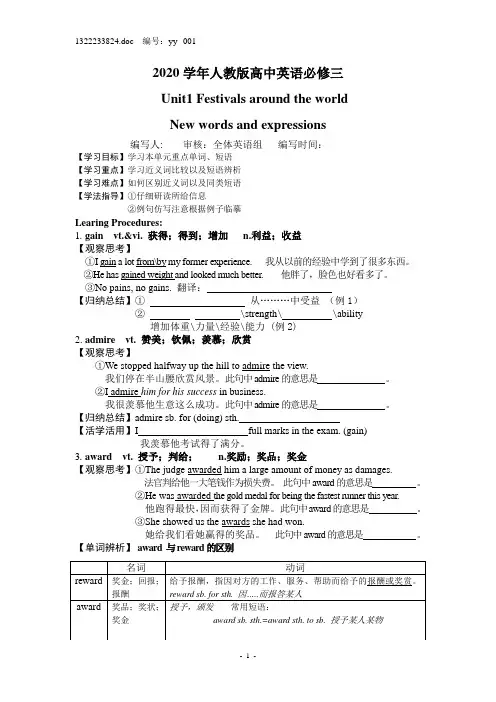
2020学年人教版高中英语必修三Unit1 Festivals around the worldNew words and expressions编写人: 审核:全体英语组编写时间:【学习目标】学习本单元重点单词、短语【学习重点】学习近义词比较以及短语辨析【学习难点】如何区别近义词以及同类短语【学法指导】①仔细研读所给信息②例句仿写注意根据例子临摹Learing Procedures:1. gain vt.&vi. 获得;得到;增加n.利益;收益【观察思考】①I gain a lot from\by my former experience. 我从以前的经验中学到了很多东西。
②He has gained weight and looked much better. 他胖了,脸色也好看多了。
③No pains, no gains. 翻译:【归纳总结】①从………中受益(例1)② \strength\ \ability增加体重\力量\经验\能力 (例2)2. admire vt. 赞美;钦佩;羡慕;欣赏【观察思考】①We stopped halfway up the hill to admire the view.我们停在半山腰欣赏风景。
此句中admire的意思是。
②I admire him for his success in business.我很羡慕他生意这么成功。
此句中admire的意思是。
【归纳总结】admire sb. for (doing) sth.【活学活用】I full marks in the exam. (gain)我羡慕他考试得了满分。
3. award vt. 授予;判给;n.奖励;奖品;奖金【观察思考】①The judge awarded him a large amount of money as damages.法官判给他一大笔钱作为损失费。
此句中award的意思是。
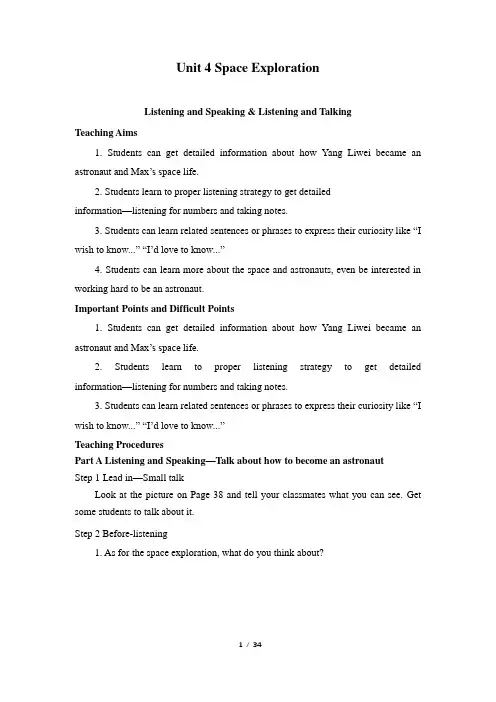
Unit 4 Space ExplorationListening and Speaking & Listening and TalkingTeaching Aims1. Students can get detailed information about how Yang Liwei became an astronaut and Max’s space life.2. Students learn to proper listening strategy to get detailed information—listening for numbers and taking notes.3. Students can learn related sentences or phrases to express their curiosity like “I wish to know...” “I’d love to know...”4. Students can learn more about the space and astronauts, even be interested in working hard to be an astronaut.Important Points and Difficult Points1. Students can get detailed information about how Yang Liwei became an astronaut and Max’s space life.2. Students learn to proper listening strategy to get detailed information—listening for numbers and taking notes.3. Students can learn related sentences or phrases to express their curiosity like “I wish to know...” “I’d love to know...”Teaching ProceduresPart A Listening and Speaking—Talk about how to become an astronautStep 1 Lead in—Small talkLook at the picture on Page 38 and tell your classmates what you can see. Get some students to talk about it.Step 2 Before-listening1. As for the space exploration, what do you think about?Answers: space, shuttle, astronaut, spaceship, rocket, space suit, solar system...2. Can you name any famous astronauts from China or abroad? Have Ss name some.3. Do you know anything about the selection procedure for astronauts? Make a list of the possible requirements.Step 3 While-listening—Task 1Listen to the interview and tick the correct statements in Activity 2.Then check the answers in class.Step 4 While-listening—Task 2Listen again and fill in the blanks with the correct numbers in Activity 3.Before listening, go through “Listen for numbers”. Then get some Ss to check their answers.Step 5 While-listening—Task 3Listen to the interview again and make a list of the requirements for becoming an astronaut.●Education background: college degree●Experience: rich experience of fighter●Health condition: perfect physical and mental health and body shape; properheight and weight●Courses: English, science and astronomy●Special training: using space equipment; physical and mental trainingStep 6 Post-listening—SpeakingWork in pairs. Discuss whether you would like to be an astronaut in the future and give your reasons. Use what you have learnt from the interview to help you.Go through the example first then practice with your partners.Then Get some pairs to share the dialogues.Step 7 Pronunciation1. Read the poem. Mark the stressed syllables with O and unstressed syllables with o.2. Then try reading the poem to each other with rhythm. Then get some Ss to read the poem.3. Listen and repeat after the recording. Check whether Ss’ mark-ups are correct.Part B Listening and Talking—Talk about life in spaceStep 1 Before-listeningBefore you listen, look at the pictures in Activity 1 and guess whether they would be useful for astronauts in space. Have Ss discuss and share.Step 2 While-listeningMax is interviewing Captain Brown about his life in space. Listen to the interview and answer the questions.1. What did Captain Brown usually wear inside the station?2. How did he prepare his food in space?3. How did he keep himself clean in space?4. How did he spend most of his time in space?5. What did he do during his free time?6. What did he look forward to most during his stay in space?Then check the answers with the class.Step 3 TalkingWork in groups. Imagine you are going to a space camp and Captain Brown has been invited to give a talk. Discus the questions you would like to ask him and then make a list. Go through the example dialogue first.Expressing curiosity●I’d love to know...●I wonder how/what/why/...●Well, I’d really like to find out...●I’d particularly like to know...●I’m most curious about...●I’m most interested to discover...●I’m very keen to know... ●I wish to know...●I hope you won’t mind me asking about...Step 4 HomeworkFinish the exercises in Workbook.Unit 4 Space ExplorationReading and Thinking【教学目标】1. Read quickly to get detailed information according the timeline; read carefully to summarize the main idea.2. Learn the reading skills—finding the timeline and summarizing the main idea by finding the words or ideas.3. Have a passion for our country and be proud of the space exploration.4. Learn to think critically about the space exploration.【教学重难点】1. Read quickly to get detailed information according the timeline; read carefully to summarize the main idea.2. Learn the reading skills—finding the timeline and summarizing the main idea by finding the words or ideas.【教学过程】Step 1 Lead in —Small talkWatch a video about Space experiment and discuss what you have learnt from it. Step 2 Before reading —Predict the contentSpace: the final frontierChinese meaning: 太空:最后的边境Frontier: the border, which might mean the human’s recognition edge or exploration edge.From the title and the pictures and the title, we can know that the article might be about the development of space exploration. It broadens us human’s recognition edge or exploration edge. So it is an exposition.Step 3 While reading —Task 11. Read the text. Several sentences have been removed from it. Choose the correct sentences A —D to fill each gap in the text.A. Although scientists try to make sure nothing goes wrong, accidents can still happen.B. They also really wish to discover other planets that are suitable enough to support life.C. The future of space exploration remains bright.D. After many experiments, they succeeded in making rockets that could escape Earth’s gravity.Answers: BDAC2. Scan the text and match the main idea.Para 1 A.China has made great progress in exploring space.Para 2 B.The future of space exploration remains bright.Para 3 C.The achievements that the USSR and America made.Para 4 D.People have always wanted to explore space.Para 5 E.The desire of people to explore the universe never died.Answers: DCEAB3. The main idea of the passage is the space exploration of humankind.Step 4 While reading—Task 2Read the text and fill in the tableStep 5 While reading—Task 3Read the text again and answer the following questions. Then have Ss share their answers.Q1: Who was the first person in the world to go into the space?Q2: Who was the first man to orbit Earth in Shenzhou 5 spacecraft?Q3: In which satellites all the astronauts died during their missions?Q4: What is the function of the International exploration?Q5: What can you learn from Para 4?Q6: What is the attitude to the space exploration?Step 6 Post reading1. RetellHave some Ss try to retell the text.2. Critical thinkingQ1: What do you think of the space exploration?I think it is beneficial to us. Through further study of space, people will make full use of it in the future, such as the space experiments by Wang Yaping in Tian Gong 1.Q2: If you are determined to be an astronaut, what should you prepare at present?First of all, I should study hard to get a related college degree. Besides, I must keep mental and physical healthy.Step 7. HomeworkTry to summarize the structure of the article by a mind map.Unit 4 Space ExplorationDiscovering Useful Structures【教学目标】1. Learn the structure, functions and features of infinitives.2. Learn to summarize some rules about infinitives to show purpose and modify.3. Learn to use infinitives in oral and writing English.【教学重难点】1. Learn to summarize some rules about infinitives to show purpose and modify.2. Learn to use infinitives in oral and writing English.【教学过程】Step 1 Lead in—Pair workLook at the following sentences and focus on the italicized infinitives. In pairs, discuss their functions.1. I trained for a long time to fly airplanes as a fighter pilot.(作目的状语)2. As we all know, an astronaut needs to be healthy and calm in order to work in space.(作目的状语)3. First of all, you must be intelligent enough to get a related college degree.(作目的状语)4. Some scientist were determined to help humans realize their dream to explore space.(作定语)5. On 12 April 1961, Yuri Gagarin became the first person in the world to go into space.(作定语)Summary:1.不定式的结构:to+do原形。
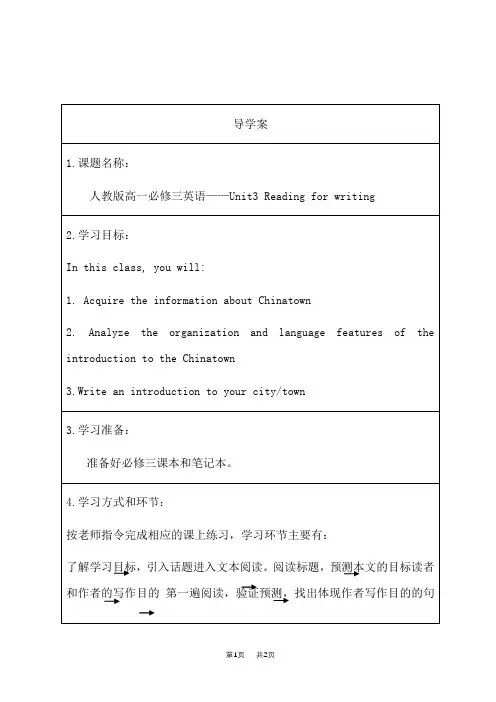
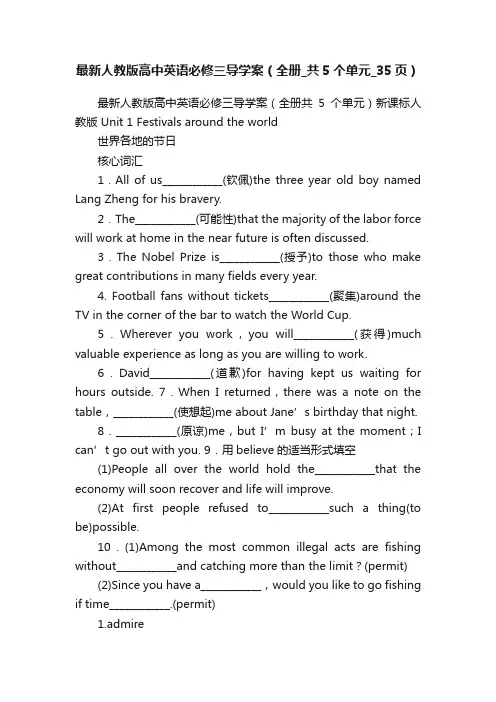
最新人教版高中英语必修三导学案(全册_共5个单元_35页)最新人教版高中英语必修三导学案(全册共5个单元)新课标人教版 Unit 1 Festivals around the world世界各地的节日核心词汇1.All of us____________(钦佩)the three year old boy named Lang Zheng for his bravery.2.The____________(可能性)that the majority of the labor force will work at home in the near future is often discussed.3.The Nobel Prize is____________(授予)to those who make great contributions in many fields every year.4. Football fans without tickets____________(聚集)around the TV in the corner of the bar to watch the World Cup.5.Wherever you work,you will____________(获得)much valuable experience as long as you are willing to work.6.David____________(道歉)for having kept us waiting for hours outside. 7.When I returned,there was a note on the table,____________(使想起)me about Jane’s birthday that night.8.____________(原谅)me,but I’m busy at the moment;I can’t go out with you. 9.用believe的适当形式填空(1)People all over the world hold the____________that the economy will soon recover and life will improve.(2)At first people refused to____________such a thing(to be)possible.10.(1)Among the most common illegal acts are fishing without____________and catching more than the limit?(permit)(2)Since you have a____________,would you like to go fishing if time____________.(permit)1.admire2.possibility3.awarded4.gathered5.gain6.apologized7.reminding8.Forgive9.(1)beliefssion (2)believe10.(1)permission (2)permit;permits高频短语1.________________ 发生2.________________ 纪念;追念3.________________ 盛装;打扮;装饰4.________________ 搞恶作剧;诈骗;开玩笑5.________________ 期望;期待;盼望6.________________ 日夜;昼夜;整天7.________________ 好像8.________________ 玩得开心9.________________ 出现;到场10.________________ 守信用;履行诺言11.________________ 屏息;屏气12.________________ 出发;动身;使爆炸13.________________ 使……想起……1.take place 2.in memory of 3.dress up 4.play a trick on 5.look forward to 6.day and night 7.as though 8.have fun with 9.turn up 10.keep one’s word 11.hold one’s breath 12.set off 13.remind...of...重点句式1.At that time people would starve if food____________,especially during the cold winter months.在当时,如果食物难以找到,人们就会挨饿,特别是在寒冷的冬季。
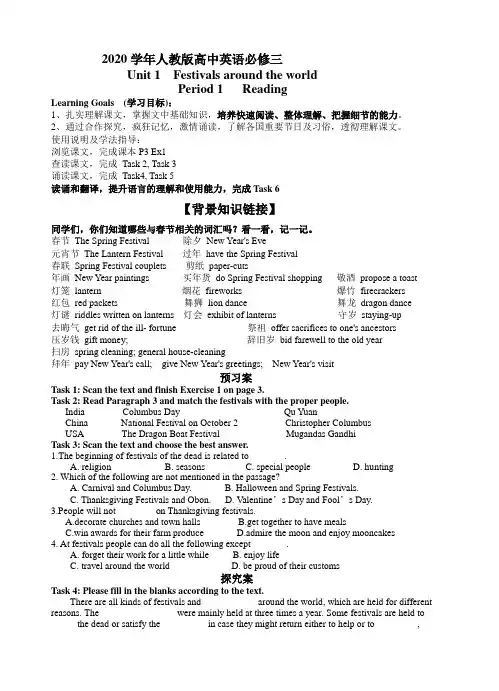
2020学年人教版高中英语必修三Unit 1 Festivals around the worldPeriod 1 ReadingLearning Goals (学习目标):1、扎实理解课文,掌握文中基础知识,培养快速阅读、整体理解、把握细节的能力。
2、通过合作探究,疯狂记忆,激情诵读,了解各国重要节日及习俗,透彻理解课文。
使用说明及学法指导:浏览课文,完成课本P3 Ex1查读课文,完成Task 2, Task 3诵读课文,完成Task4, Task 5读诵和翻译,提升语言的理解和使用能力,完成Task 6【背景知识链接】同学们,你们知道哪些与春节相关的词汇吗?看一看,记一记。
春节The Spring Festival 除夕New Year's Eve元宵节The Lantern Festival 过年have the Spring Festival春联Spring Festival couplets 剪纸paper-cuts年画New Year paintings 买年货do Spring Festival shopping 敬酒propose a toast灯笼lantern 烟花fireworks 爆竹firecrackers红包red packets 舞狮lion dance 舞龙dragon dance灯谜riddles written on lanterns 灯会exhibit of lanterns 守岁staying-up去晦气get rid of the ill- fortune 祭祖offer sacrifices to one's ancestors压岁钱gift money; 辞旧岁bid farewell to the old year扫房spring cleaning; general house-cleaning拜年pay New Year's call; give New Year's greetings; New Year's visit预习案Task 1: Scan the text and finish Exercise 1 on page 3.Task 2: Read Paragraph 3 and match the festivals with the proper people.India Columbus Day Qu YuanChina National Festival on October 2 Christopher ColumbusUSA The Dragon Boat Festival Mugandas GandhiTask 3: Scan the text and choose the best answer.1.The beginning of festivals of the dead is related to _______.A. religionB. seasonsC. special peopleD. hunting2. Which of the following are not mentioned in the passage?A. Carnival and Columbus Day.B. Halloween and Spring Festivals.C. Thanksgiving Festivals and Obon.D. V alentine’s Day and Fool’s Day.3.People will not________ on Thanksgiving festivals.A.decorate churches and town hallsB.get together to have mealsC.win awards for their farm produceD.admire the moon and enjoy mooncakes4. At festivals people can do all the following except _______.A. forget their work for a little whileB. enjoy lifeC. travel around the worldD. be proud of their customs探究案Task 4:Please fill in the blanks according to the text.There are all kinds of festivals and ___________ around the world, which are held for different reasons. The _______ ________ were mainly held at three times a year. Some festivals are held to _____ the dead or satisfy the _________ in case they might return either to help or to ____ ____,while other festivals are held to honor famous people or the gods, such as______ _____ ______ and Columbus Day. Harvest and Thanksgiving festivals are happy events because the food is _________ for the winter and the __________work is over. And the most ________ and important festivals are the ones that look forward to the end of winter and to the ______ of spring, such as the ______ New Year, at which people have a very good time.Some Western countries have very exciting ______. Festivals let us enjoy _________.Task 5: Work in pairs and discuss the following question,then fill in with your ideas .which festivals do you think are the most important and which are the most fun?___________________________________________________________________________________ ___________________________________________________________________________________ ___________________________________________________________________________________ ___________________________________________________________________________________ ___________________________________________________________________________________ ___________________________________________________________________________________Task6: Fill in the blanks of below sentences and pay attention to the words in bold.Task6: Fill in the blanks of below sentences and pay attention to the words in bold.1.Festivals and celebrations of all kinds have been held everywhere since ancient times.翻译:_________________________________________________________________________2. Sometimes celebrations would be held after hunters had caught animals.At that time people would starve if food was difficult to find, especially during the cold winter months.翻译:_______________________________________________________________________________________________________________________________________________________ 3.On this important feast day, people eat food in the shape of skulls and cakes with“bones” on them. 翻译:_________________________________________________________________________4. It is now a children’s festival, when they can dress up and go to their neighbour’s homes to ask forsweets.翻译:_________________________________________________________________________5.China and Japan have mid-autumn festivals, when people admire the moon and in China, enjoymooncakes.翻译:_________________________________________________________________________6.The most energetic and important festivals are the ones that look forward to the end of winter andto the coming of spring.翻译:___________________________________________________________________________ 7.The country, covered with cherry tree flowers, looks as though it is covered with pink snow.翻译:___________________________________________________________________________我的疑惑和收获:_______________________________________________________________________________ _______________________________________________________________________________ _______________________________________________________________________________ _______________________________________________________________________________。
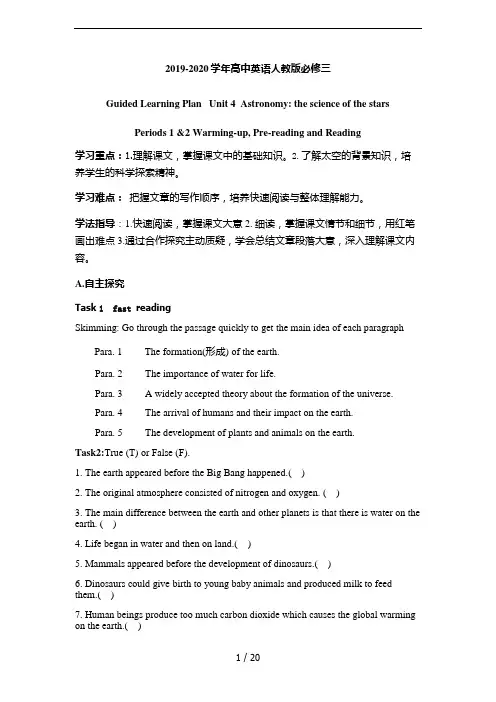
2019-2020学年高中英语人教版必修三Guided Learning Plan Unit 4 Astronomy: the science of the starsPeriods 1 &2 Warming-up, Pre-reading and Reading学习重点:1.理解课文,掌握课文中的基础知识。
2.了解太空的背景知识,培养学生的科学探索精神。
学习难点:把握文章的写作顺序,培养快速阅读与整体理解能力。
学法指导:1.快速阅读,掌握课文大意 2. 细读,掌握课文情节和细节,用红笔画出难点 3.通过合作探究主动质疑,学会总结文章段落大意,深入理解课文内容。
A.自主探究Task 1 fast readingSkimming: Go through the passage quickly to get the main idea of each paragraphPara. 1 The formation(形成) of the earth.Para. 2 The importance of water for life.Para. 3 A widely accepted theory about the formation of the universe.Para. 4 The arrival of humans and their impact on the earth.Para. 5 The development of plants and animals on the earth.Task2:True (T) or False (F).1. The earth appeared before the Big Bang happened.( )2. The original atmosphere consisted of nitrogen and oxygen. ( )3. The main difference between the earth and other planets is that there is water on the earth. ( )4. Life began in water and then on land.( )5. Mammals appeared before the development of dinosaurs.( )6. Dinosaurs could give birth to young baby animals and produced milk to feed them.( )7. Human beings produce too much carbon dioxide which causes the global warming on the earth.( )8. According to the text, human beings would disappear in the end. ( )B.合作探究Careful reading:Task1.Scan for the detailed information and find the part talking about the development of life:a cloud of ______→ a solid ______→presence of ______→ small _____ in water → _______ and all sorts of fish → Green ____ on land → ______ and ______ appear → Plants grew into _______ → _____ (on land) →__________( on land) → __________ (on land) →____________ (small clever animals on land)Task2.Read the passage again and try to finish the answers below.1).Why was the earth different from other planets?2).Why did the plants grow before the animals came?3).Why is it wrong in films and stories to show dinosaurs and people together?4).Why do you think that humans are the cleverest animals on the earth?5).There used to be nine planets in the solar system. Recently scientists have decided that one of them can no longer be considered a planet. Do you know the name of that planet? Do you know why they removed it?6).What problem is caused by human beings?C.反馈测试根据课文完成短文并复述课文The _________of the earth produced water vapour, which turned into water when the earth ________down. Water allowed the earth to ________harmful gases into the oceans and seas. That made it possible for life to begin to develop. The arrival of small________ encouraged the development of early shellfish and all ________of fish. Many millions of years later the first________ plants began to appear on land. Later land animals appeared. Some were insects. At last________ rule the world, but they are not taking _________of the earth very well.D.延伸拓展根据所给首字母或中文意思填写单词。
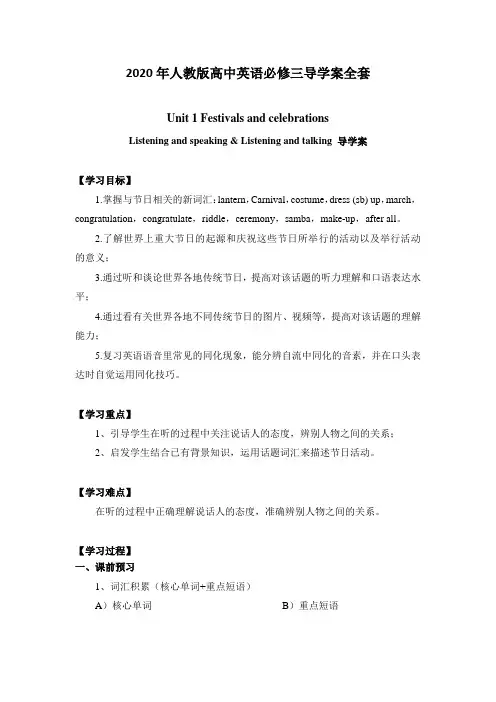
2020年人教版高中英语必修三导学案全套Unit 1 Festivals and celebrationsListening and speaking & Listening and talking 导学案【学习目标】1.掌握与节日相关的新词汇:lantern,Carnival,costume,dress (sb) up,march,congratulation,congratulate,riddle,ceremony,samba,make-up,after all。
2.了解世界上重大节日的起源和庆祝这些节日所举行的活动以及举行活动的意义;3.通过听和谈论世界各地传统节日,提高对该话题的听力理解和口语表达水平;4.通过看有关世界各地不同传统节日的图片、视频等,提高对该话题的理解能力;5.复习英语语音里常见的同化现象,能分辨自流中同化的音素,并在口头表达时自觉运用同化技巧。
【学习重点】1、引导学生在听的过程中关注说话人的态度,辨别人物之间的关系;2、启发学生结合已有背景知识,运用话题词汇来描述节日活动。
【学习难点】在听的过程中正确理解说话人的态度,准确辨别人物之间的关系。
【学习过程】一、课前预习1、词汇积累(核心单词+重点短语)A)核心单词B)重点短语2.Brainstorming:There are many different festivals in our country. Which festivals do you like?二、Pronunciation1. The change in the pronunciation of the bold letters.①d uty, e d ucation ②u s e, u s ually ③new s, new s paper ④i s, i ss ue⑤las t year ⑥i n bed ⑦tho s e shirts ⑧a s you see2. The change in the pronunciation of the consonants in the sentences.①Di d you enjoy the holiday?②Miss, congratulations o n becoming an adult!③It’ll be too tiring to walk or dance for a long time in tho s e shoes.④I was hoping to hear tha t you had a great time throughout.⑤Children then take part in Easter egg hunts to find the eggs and wi n prizes.⑥I n Mexico, the Day of the Dead is celebrated between October 31st and November 2nd.三、Language points1.dress (sb) up 穿上盛装;装扮【例句】Did you dress up for the occasion?是否曾为重大场合而精心打扮?【归纳拓展】dress up as... 装扮成……;打扮成……dress oneself 自己穿衣be dressed in 穿着……(表示穿的状态)【小试牛刀】①She loved to dress _____ and she reveled in the attention bestowed up herfrom the other students.她喜欢精心打扮,陶醉于其他学生对她的注意。
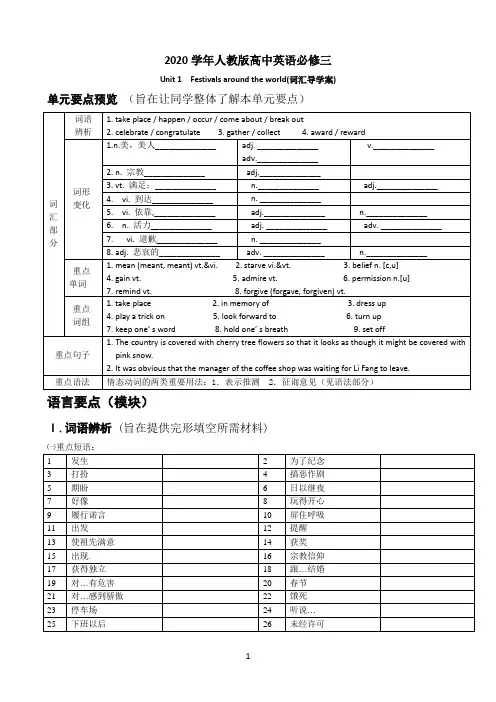
2020学年人教版高中英语必修三Unit 1 Festivals around the world(词汇导学案) 单元要点预览(旨在让同学整体了解本单元要点)词汇部分词语辨析1. take place / happen / occur / come about / break out2. celebrate / congratulate3. gather / collect4. award / reward词形变化1.n.美,美人______________ adj. ______________adv.______________v.______________2. n. 宗教______________ adj.______________3. vt. 满足;______________ n.______________ adj.______________4. vi. 到达______________ n. ______________5. vi. 依靠,______________ adj.______________ n.______________6. n. 活力______________ adj. ______________ adv. ______________7. vi. 道歉______________ n. ______________8. adj. 悲哀的______________ adv. ______________ n.______________重点单词1. mean (meant, meant) vt.&vi.2. starve vi.&vt.3. belief n. [c,u]4. gain vt.5. admire vt.6. permission n.[u]7. remind vt. 8. forgive (forgave, forgiven) vt.重点词组1. take place2. in memory of3. dress up4. play a trick on5. look forward to6. turn up7. keep one’ s word 8. hold one’ s breath 9. set off重点句子1. The country is covered with cherry tree flowers so that it looks as though it might be covered with pink snow.2. It was obvious that the manager of the coffee shop was waiting for Li Fang to leave.重点语法情态动词的两类重要用法:1.表示推测 2.征询意见(见语法部分)语言要点(模块)Ⅰ.词语辨析(旨在提供完形填空所需材料)㈠重点短语:1 发生2 为了纪念3 打扮4 搞恶作剧5 期盼6 日以继夜7 好像8 玩得开心9 履行诺言10 屏住呼吸11 出发12 提醒13 使祖先满意14 获奖15 出现16 宗教信仰17 获得独立18 跟…结婚19 对…有危害20 春节21 对…感到骄傲22 饿死23 停车场24 听说…25 下班以后26 未经许可㈡重点词语的用法(每空填一个单词):27.They held a party in memory of the old man’s retire ment.=They held a part y in order to __________________ the old man’s retirement.28.I don’t care even if you go fasting. You won’t __________________ me into promising you anything extra. 29.Droughts & floods occur by turns almost every year, cutting the harvest in large amounts, & as a result, __________________ millions of people.30.__________________ of capitals & natural resources, plenty of African countries are __________________ for international a ss istance.31.The belief __________________ God helps those who help themselves didn’t ever convince him, who was always waiting for warm hearts.32.Please call me __________________ arrival to relieve me from worries about your trip.33.I do envy you your success. = I do __________________ you for your success.34.He won a gold medal. = He was __________________ a gold medal.35.He refused any spiritual encouragement, praise, for example. Is he likely to be content with such material ____________________ as prizes & rewards? God knows!36.Guess how hard it was for me to look forward to ____________________ from you! As the letter I had been looking forward to __________________ (turn up) in my hand, tears didn’t wait to drop down my face.㈢重点句型:37.Sometimes celebrations __________________ be held after hunters had caught animals.38.Some festiva ls are held to honor the dead or to satisfy the ancestors, __________________ might return either to help or to do harm.39. For the Japanese festival Obon, people __________________ go to clean graves & light incense in memory oftheir ance stors.40. They also light lamps & play music because they think this __________________ lead the ancestors back toearth.41. If the neighbors do not give any sweets, the children __________________ play a trick on them.42. Hu Jin didn’t turn up. She __________________ be with her friends right now laughing at him.43. It was obvious __________________ the manager of the coffee shop was waiting for Li Fang to leave—hewiped the table, then sat down & turned on the TV—just __________________ Li Fang needed!44. Li Fang thought, “I’ll just throw these flowers & chocolates away. I don’t want them to remind me of her.”__________________ he did.45. As Li Fang sadly passed the tea shop __________________ the corner__________________ his way home, he heard a voice __________________ him. __________________ was Hu Jin waving at him.Ⅱ.词性变化(旨在提供语法填空所需材料)【练习】用括号内所提供词的适当形式填空。
高一英语必修三导学案Unit 1 Festivals around the world 单元要点预览(旨在让同学整体了解本单元要点)语言要点(模块)Ⅰ.词语辨析(旨在提供完形填空所需材料)Ⅱ.词性变化(旨在提供语法填空所需材料)Ⅲ.重点词汇(旨在提供词汇综合运用所需材料)1. mean (meant, meant) vt.&vi. 意思是;意味着;打算;预定[典例]1). The sign means that the road is blocked. 这个标志表示此路不通。
2). What do you mean to do with it? 你打算把它怎样处理?3). I mean you to work as our spokesman. 我想请你当我们的代言人。
[重点用法](sth.) mean doing sth. 意味着…(sb) mean to do sth. 打算做…had meant to do sth. 本来打算做某事be meant for 打算作……用;打算给…(sth.) be meant to do sth. 被预定/指定/认为做某事What do/did you mean by...? “你……是什么意思?”[练习] 按要求填空或翻译。
1). Can you tell me what this sentence______ (mean)?2). Your friendship ______ (mean) a great deal ______ (介词) me.3). In some parts of London, missing a bus means ______ (wait) for another hour.4). What did he mean ______ (介词) saying that remark?5). I ______ ______ ______ ______(本来打算来)yesterday, but I had an unexpected visitor.6). 这些房间是打算用作少年活动中心的。
2020学年人教版高中英语必修三Unit 1 Festivals around the worldLearning Plan (I) for Warming up and Reading学习目标:1. 运用快速阅读和详细阅读的策略,准确把握文章主旨大意。
2. 熟悉本课新单词和词组的意思,并能把有关词汇运用到具体语境.。
3. 阅读短文,了解重要的节日。
4. 自主合作学习。
重点知识:准确把握文章主旨大意难点知识:在阅读中,对文章的信息进行提取、筛选和重组。
自主预习案使用说明:通过自主预习课文,完成预习案。
学法指导:一、教材助读:Look at page 1-2, read this passage (Festivals and Celebrations)quickly.二、预习自测:1)Finish Warming up and Pre-reading.2)Skimming:What festivals are mentioned in each paragraph?P 2. Festivals of the DeadP 3. Festivals to Honour PeopleP 4. Harvest FestivalsP 5. Spring Festivals3)Scanning: Go through the text and then decide if they are True or False.1. All ancient festivals would celebrate the end of cold weather, planting in spring andharvest in autumn.()2. In Mexico, people celebrate the Day of the Dead in early November. ()3. The Dragon Boat Festival is held to honor the famous ancient poet, QuYuan. ()4. Spring Festivals are the most important ones in the world. ()5. The ancient people needn’t worry a bout their food. ( )6. Mid-autumn Festival is only held in China. ( )7. Easter celebrates the birth of Jesus. ( )三、我的疑惑?合作探究案使用说明:通过对文章细节阅读,和本小组成员共同探究完成。
2020学年人教版高中英语必修三Unit1 Festivals around the worldWords【学习目标】1、课前预习、记忆单词,能够会读、会写。
2、通过查字典、小组合作探究,掌握单词的用法。
3、通过巩固练习提高并加深对单词的理解与应用。
【重点难点】重点单词:starve, gain, gather, award, admire, permission, apologize, drown, obvious, remind, forgiveI.【自主学习】The classification of parts of speechn. beauty, harvest, celebration, hunter, origin, ancestor, grave, incense, feast, skull, bone, belief, trick, poet, arrival, independence, agriculture, award, produce, rooster, Easter, parade, clothing, Christian, cherry, blossom, custom, rosebud. fool, necessity, permission, prediction, fashion, parking, sadness, herd, magpie, weep, announcerv.harvest, starve, trick, gain, gather, award, admire, fool, apologize, drown, wipe, weave, weep, remind, forgiveadj. religious, seasonal, independent, agricultural, energetic, lunar, Christian, worldwide, fool, obvious,II. 【合作探究】1. harvest /gather/get in n. /vt /vi. 收成,收获,收割1)Farmers are extremely busy during the harvest.(在收获季节)2) We will have a good harvest(大丰收)this year.3) Winter wheat is planted in the autumn and harvested in early summer. (而初夏收割)4) Farmers are harvesting/are gathering/are getting in their crops.(正在收割庄稼).用法总结:a good harvestharvest crops2. starve vi/ vt挨饿,很饿, (使)饿死;饿得要死starvation n.starve for sth.=be starved of =long for=be dying for=be thirsty for;渴望获得某事物1)Thousands of people starved(挨饿) after the crops failed this year.2) The wolf was starved into hanging itself.那只狼被饿得上吊而死。
新人教版英语必修三教案全套教案标题:新人教版英语必修三教案全套教案一:Unit 1 Friendship课时安排:2课时课程目标:1. 学生能够理解并运用本单元的核心词汇和短语。
2. 学生能够运用所学的语言知识,描述和谈论友谊。
3. 学生能够通过语言交流,增进彼此之间的友谊。
教学内容:1. 词汇:friendship, loyal, trustworthy, betray, etc.2. 语法:情态动词“should”和“could”的用法。
3. 阅读理解:阅读一篇关于友谊的短文,并回答相关问题。
4. 口语表达:描述自己与朋友之间的友谊,并展开讨论。
教学步骤:Step 1: 导入新课 (10分钟)1. 利用图片和问题引入话题,让学生思考友谊的重要性。
2. 引导学生讨论友谊的特点和好处。
Step 2: 词汇学习 (15分钟)1. 呈现核心词汇和短语,并教授其发音和意义。
2. 进行词汇练习,巩固学生的记忆和理解。
Step 3: 语法讲解 (15分钟)1. 介绍情态动词“should”和“could”的用法,并与友谊的话题结合。
2. 给予例句和练习,让学生熟悉并运用这些情态动词。
Step 4: 阅读理解 (20分钟)1. 分发一篇关于友谊的短文,让学生阅读并回答相关问题。
2. 检查学生的理解和阅读技巧。
Step 5: 口语表达 (20分钟)1. 学生分组,描述自己与朋友之间的友谊,并展开讨论。
2. 教师引导学生使用所学的词汇和语法进行交流。
Step 6: 总结和评价 (10分钟)1. 教师总结本课所学的内容,并强调友谊的重要性。
2. 学生进行自我评价,反思本课的学习情况。
教案二:Unit 2 English around the World课时安排:3课时课程目标:1. 学生能够理解并运用本单元的核心词汇和短语。
2. 学生能够运用所学的语言知识,描述和谈论英语在世界各地的使用情况。
3. 学生能够通过语言交流,增进彼此之间的跨文化理解。
Unit 3 The Million Pound Bank Note年级:高一科组:英语科命题人:陈冬冬一、Analysis of the teaching material and the learnersThe topic of this unit is a short story by the American author Mark Twain. It is the two rich brothers Roderick and Oliver have made a bet, about a man who could survive a month in London with million pound bank note.The students are second-grade students of senior high school.some of them are low foundation of reading English.二、Teaching aims(1)Knowledge aims:Enable the students to understand the details about the whole scene and sum up the main idea of Act 1,Scene3.Get the students to read the play.(2)Ability aims:Develop students ’s reading skills and enable them to learn how to use different reading strategies to read different reading materials.(3)Emotional aims:Stimulate students’ interest of learning English by reading and acting this play.Develop students’ sense of group cooperation and teamwork.三、Important points and difficult pointsEnable students to understand the details about the whole scene and act out the play.Enable students to learn to use reading strategies such as skimming, scanning, and so on.四、Teaching procedures【Review】Ⅰ.Match the word with its meaning.birthplace A.小说Novel B.信封Adventure C.出生地Author D.奇遇;冒险Scene E.探究;寻求wander F.著者;作家Permit G.耐性;忍耐Fault H.漫游;闲逛;漂泊Spot I.过错;缺点;故障Seek J.发觉;认出;斑点Patience K.许可;同意;通行证;执照Envelope L.〔戏剧〕一场;现场;场面;景色Ⅱ.write down the meaning of the phrases in each sentence.1.The Smiths are praised for the way they bring up their children. 〔抚养〕2.Go ahead for two blocks,then turn left. 〔前进〕3.I found the key by accident when I was cleaning the room. 〔偶然〕4.In the West people think it’s rude to stare at a person. 〔盯着看〕5.Good luck accounts for her being famous overnight. 〔解释〕6.It doesn’t seen ugly to me;on the contrary, I think it’s rather beautiful. ( 相反) Step1 Leading inQ1: Do you like movies?Q2 :Which movies is the picture standing for?(图略)Step2 While—ReadingTask1:【Scanning】Read the narrator together and try to find the 4“W〞.(P1)(1)When:(2)Where:(3)What:(4)Who:Task2:【skimming 】1.listen to the tape,underline the words you have heard and tell me what are they.(主要人物关系思维导图〕(line28-34)2.Summarize the backgroundHenry was an ___①___.One day he had an accident in a ②_ _.Luckily he was survive by a ship for ③.He arrived in London by earning his passage without pay,He was ④in the street .To his surprise,an incredible thing happened.Two ⑤brothers gave him a million pound bank-note because they had made a ⑥.Task3:1.Role play(line41-56)2.Others think and discuss the following questions(1)What do you think of Henry and the two brothers?㈠For Henry:“well, it may seen luck to you but not to me〞“If this is your idea of some kind of joke,I don’t think it’s very funny〞“Now,if you’ll excuse me, I think I’ll be on my way〞( direct/frank )“I do not want your charity.I just want an honest job〞(hard-working )㈡The two brothersRich:Naughty :Good judges of a man:Step3 Conclusion:Put the following event in correct order:A、Henry wandered in London streets.B、About a month ago Henry Adams was sailing out of the bay.C、The next morning he was spotted by a ship.D、Towards nightfall he found himself carried out to sea by a strong wind.E、On the ship he earned his passage by working as an unpaid hand.。
2020年人教版高中英语必修三导学案全套Unit 1 Festivals and celebrationsListening and speaking & Listening and talking 导学案【学习目标】1.掌握与节日相关的新词汇:lantern,Carnival,costume,dress (sb) up,march,congratulation,congratulate,riddle,ceremony,samba,make-up,after all。
2.了解世界上重大节日的起源和庆祝这些节日所举行的活动以及举行活动的意义;3.通过听和谈论世界各地传统节日,提高对该话题的听力理解和口语表达水平;4.通过看有关世界各地不同传统节日的图片、视频等,提高对该话题的理解能力;5.复习英语语音里常见的同化现象,能分辨自流中同化的音素,并在口头表达时自觉运用同化技巧。
【学习重点】1、引导学生在听的过程中关注说话人的态度,辨别人物之间的关系;2、启发学生结合已有背景知识,运用话题词汇来描述节日活动。
【学习难点】在听的过程中正确理解说话人的态度,准确辨别人物之间的关系。
【学习过程】一、课前预习1、词汇积累(核心单词+重点短语)A)核心单词B)重点短语2.Brainstorming:There are many different festivals in our country. Which festivals do you like?二、Pronunciation1. The change in the pronunciation of the bold letters.①d uty, e d ucation ②u s e, u s ually ③new s, new s paper ④i s, i ss ue⑤las t year ⑥i n bed ⑦tho s e shirts ⑧a s you see2. The change in the pronunciation of the consonants in the sentences.①Di d you enjoy the holiday?②Miss, congratulations o n becoming an adult!③It’ll be too tiring to walk or dance for a long time in tho s e shoes.④I was hoping to hear tha t you had a great time throughout.⑤Children then take part in Easter egg hunts to find the eggs and wi n prizes.⑥I n Mexico, the Day of the Dead is celebrated between October 31st and November 2nd.三、Language points1.dress (sb) up 穿上盛装;装扮【例句】Did you dress up for the occasion?是否曾为重大场合而精心打扮?【归纳拓展】dress up as... 装扮成……;打扮成……dress oneself 自己穿衣be dressed in 穿着……(表示穿的状态)【小试牛刀】①She loved to dress _____ and she reveled in the attention bestowed up herfrom the other students.她喜欢精心打扮,陶醉于其他学生对她的注意。
②I like to dress _______ nice clowns and scary ones.我喜欢装扮成善解人意的小丑和胆小的小丑。
③She is ________ snow-white furs today and underneath __________ the rind skirt of brown, the boots in dark.她今天穿着雪白的皮草,下面穿着棕色的皮裙,黑色的长靴。
2.congratulation n. 祝贺;恭喜【例句】Congratulations! We are pleased to tell you that you have won the high school speaking competition about new Tangshan.恭喜你!我们很高兴地告诉你,你已经赢得了以新唐山为主题的高中组演讲比赛。
【归纳拓展】congratulate vt.向(某人)道贺;(因某事)为自己感到自豪receive congratulations from.. 接受……的祝贺offer/send congratulations to sb on sth 向某人祝贺某事congratulate sb on (doing) sth 就某事向某人祝贺【小试牛刀】单句语法填空①________________(congratulate) on your 50th wedding anniversary!②I congratulate you _______what you have achieved.③We sent our congratulations to her on passing the exam.=We ______________________ passing the exam.她通过了考试,我们向她表示祝贺。
3.after all毕竟,终究【例句】After all, individual strength is limited.个人的力量毕竟是有限的。
【归纳拓展】first of all 首先above all 最重要的是all in all 总的来说not…at all… 根本不all the time 始终,一直all right 行,可以all at once 立刻,马上for all 尽管【小试牛刀】用含有all的短语填空:①_____, it is an interesting book.总之,这是一本有趣的书。
②We must work hard, and _____ we must believe in ourselves.我们应该努力工作,最重要的是我们必须相信自己③We will learn Unit 2 today. _____, let’s have a dictation.今天我们将要学习第二单元,首先我们进行听写。
④There are 1500 people ______.一共有1500人。
【课后巩固】单词拼写1. The leader was________(钦佩)for his great talent and sense of responsibility.2. Zhou Xun was ________(授予)the best actress for her excellent performance in Feng Sheng.3. As is known to all, China is an ________(农业的)country for thousands of years.4. He g________ all his strength and prepared himself for a second try.5. I won’t forgive him unless he a________ to me first.6. They were trapped in the mountain for many days and everyone was in dangerof being s________ to death.7. No one can go out of the yar d without the headmaster’s ________(允许).8. She is a ________(虔诚的)Christian and goes to church every week.9. It is ________(明显的)that she doesn’t care what others think of her.10. People have given up the ________(信任,信仰)in his honesty.Unit 1 Festivals and celebrationsReading and Thinking导学案【学习目标】1.阅读以“我们为何庆祝节日”为主题的论说文,梳理论说文的语篇结构和文本逻辑,了解节日风俗发展与变迁,感悟节日的内涵与意义;2.能够结合文本特点快速而准确地找到主题句;3.能够归纳和积累用于表达情绪的相关词汇;4.了解不同国家、不同民族的节日文化,梳理、分析和提炼节日的精神内涵,理解世界各国人民共同的情感和精神追求。
【学习重点】1.结合文本特点快速而准确地找到主题句;2.正确理解和掌握阅读文本中的新词汇;3.了解不同国家、不同民族的节日文化,梳理、分析和提炼节日的精神内涵,理解世界各国人民共同的情感和精神追求。
【学习难点】1.梳理论说文的语篇结构和文本逻辑,了解节日风俗发展与变迁,感悟节日的内涵与意义;2.引导学生了解不同国家、不同民族的节日文化,分析和提炼节日的精神内涵,理解世界各国人民共同的情感和精神追求。
【学习过程】一、课前预习1.词汇积累(核心单词+重点短语)A)核心单词B)重点短语词语释义(首字母已给出)①o_______ the point from which sth. starts; the cause of sth.②a_______ the science or practice of farming③t_______ having the usual qualities or features of a particular type of person, thing or group④c_______ connected with the buying and selling of goods and services⑤m_______ in the middle between two sizes, amounts, lengths, temperatures, etc.⑥b_______ a strong feeling that sth./ sb. exists or is true; confidence that sth./ sb. is good or right⑦o_______ a particular time when sth. happens; or a special event, ceremony or celebration⑧g_______ feeling or showing thanks because sb. has done sth. kind for you or has done as you asked⑨d_______ to make sth. look more attractive by putting things on it⑩s_______ large or important enough to have an effect or to be noticed二、课文理解1. Look at the picture and the title on Page 4 and predict what the text is probablyabout?The text is probably about ___________________________.2. Choose the best answer according to the passage.(1)Which festival can be found in almost every culture?A.The festival about religions. B.The festival about famous figures.C.The festival about important events. D.The festival about the harvest season.(2)Which country celebrated the harvest festival during the springtime?A.Ancient Egypt. B.Ancient China.C.Ancient India. D.Ancient Japan.(3)Why is lighting firecrackers stopped in Chinese Spring Festival?A.To drive away the evil spirits.B.To stop air pollution from happening.C.To become an exciting festival for children.D.To save money and spend more on gifts.(4)What will you find if you study festivals carefully?A.Festivals are an important part of society.B.Festivals are becoming more and more commercial.C.Customs play a significant role in festivals.D.Different cultures have much in common.三、Language points1.range n.一系列;范围;界限vi.包括;(在一定范围内)变化【例句】They have a wide range of origins, such as the seasons of the year, religions, famous figures and important events.节日的由来五花八门,比如时节、宗教、著名人物及重大事件。